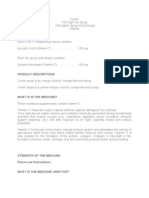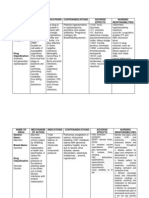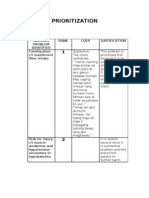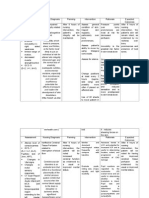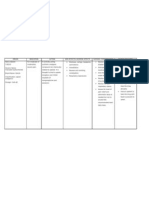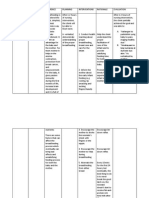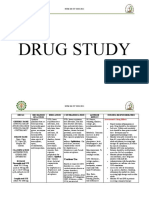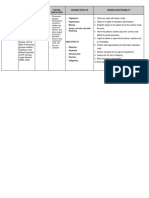Ascorbic Acid
Ascorbic Acid
Uploaded by
Adreanah Martin RañisesCopyright:
Available Formats
Ascorbic Acid
Ascorbic Acid
Uploaded by
Adreanah Martin RañisesCopyright
Available Formats
Share this document
Did you find this document useful?
Is this content inappropriate?
Copyright:
Available Formats
Ascorbic Acid
Ascorbic Acid
Uploaded by
Adreanah Martin RañisesCopyright:
Available Formats
ASCORBIC ACID (VIT C)
DRUG NAME CLASSIFICATION & MECHANISMS OF ACTION INDICATION & DOSAGE CONTRAINDICATION ADVERSE EFFECT Nursing Responsibilities Reference
Ascorbic Acid
Vitamin C
Indications Vitamin C is a compound that is necessary for proper growth and health. They are needed in small amounts only and are usually available in the normal foods that are ingested. Ascorbic acid( vitamin C) is necessary for wound healing. Vit C plays a major role in many oxidative and other metabolic reactions essential for formation and
Ascorbic acid may be contraindicated in patients with hemolytic anemia .
Transient mild soreness may occur at the site of intramuscular or subcutaneous injection. Too-rapid intravenous administration of the solution may cause temporary faintness or dizziness.
General Precautions Too-rapid intravenous injection is to be avoided. Laboratory Tests Diabetics taking more than 500 mg vitamin C daily may obtain false readings of their urinary glucose test. No exogenous vitamin C should be ingested for 48 to 72 hours before aminedependent stool occult blood tests are conducted because possible false-negative results may occur. Usage in Pregnancy
.medicinenet. com/ascorbic_acidoral/page2.htm webhealthcentre. com/drugix/Vitamin_ C_di0149.aspx
stabilization of collagens,conversion of folic acid to folinic acid, synthesis of adrenal steroids and catacholamines.It is very important for maintanance of intracellular tissue. -is recommended for the prevention and treatment of scurvy. Its parenteral administration is desirable for patients with an acute deficiency or for those whose absorption of orally ingested ascorbic acid (vitamin c) is uncertain.
Pregnancy Category C.' Animal reproduction studies have not been conducted with Ascorbic Acid (vitamin c) Injection. It is also not known whether Ascorbic Acid (vitamin c) Injection can cause fetal harm when administered to a pregnant woman or can affect reproduction capacity. Ascorbic Acid (vitamin c) Injection should be given to a pregnant woman only if clearly needed.
You might also like
- Ascorbic AcidDocument2 pagesAscorbic AcidJaymark Lambino50% (2)
- Drug Study - GDM - Caltrate PlusDocument2 pagesDrug Study - GDM - Caltrate PlusGAYOL BREEN IRAH A.No ratings yet
- Endorsement Week 9Document13 pagesEndorsement Week 9MICHELLE FACTONo ratings yet
- Drug Study and NCP For Eamc Ob-Gyne Ward Case PresDocument4 pagesDrug Study and NCP For Eamc Ob-Gyne Ward Case PresvirnzrobzNo ratings yet
- Drug Study Cap RHPDocument7 pagesDrug Study Cap RHPJan DeeNo ratings yet
- Dexamethasone and MgSO4Document2 pagesDexamethasone and MgSO4Nasriah MacadatoNo ratings yet
- Drug Study CeelinDocument5 pagesDrug Study CeelinRoshley Em Manzano0% (2)
- "Hindi Ko Kayo Masyadong Marinig Sa Kanang Tenga Ko, Pwede Bang Sa Kaliwang Side Ko Kayo Magsalita?" As Verbalized by The PatientDocument2 pages"Hindi Ko Kayo Masyadong Marinig Sa Kanang Tenga Ko, Pwede Bang Sa Kaliwang Side Ko Kayo Magsalita?" As Verbalized by The PatientMussaib Mushtaq100% (1)
- Drug Study FinalDocument5 pagesDrug Study FinalJackie Ann Marie DapatNo ratings yet
- NCP TEACHING PLAN (Postpartum)Document2 pagesNCP TEACHING PLAN (Postpartum)teuuuuNo ratings yet
- NCP and Drug Study For Ob WardDocument7 pagesNCP and Drug Study For Ob WardAce Fabrigas100% (1)
- PrioritizationDocument1 pagePrioritizationJLAZRONo ratings yet
- IMCI Learning FeedbackDocument1 pageIMCI Learning Feedbackinah krizia lagueNo ratings yet
- Vii. NCPDocument4 pagesVii. NCPmariaNo ratings yet
- Tramadol (Dolcet)Document1 pageTramadol (Dolcet)Beverly Ann de LeonNo ratings yet
- Drug Study NaclDocument3 pagesDrug Study NaclNicole Denise PortugalezaNo ratings yet
- Exit Ticket - Beth Taylor's CaseDocument2 pagesExit Ticket - Beth Taylor's CaseGayle RavanchoNo ratings yet
- Ferlin PDFDocument1 pageFerlin PDFRomeo ReyesNo ratings yet
- IV. Physical AssessmentDocument7 pagesIV. Physical AssessmentJustene PeñamoraNo ratings yet
- BactidolDocument1 pageBactidolRryje SallevaNo ratings yet
- NafarinDocument2 pagesNafarinianecunar100% (2)
- DrugDocument4 pagesDrugAugene ToribioNo ratings yet
- Drug Name Mechanism of Action Administration Indications Contraindications Adverse Reactions Nursing ResponsibilitiesDocument1 pageDrug Name Mechanism of Action Administration Indications Contraindications Adverse Reactions Nursing ResponsibilitiesIvan Liquiran AvenadoNo ratings yet
- Nursing Diagnosis Care Plan IDADocument1 pageNursing Diagnosis Care Plan IDAAbdallah AlasalNo ratings yet
- Name of Drug Dosage, Route & Frequency Mechanism of Action Indication Contraindication Side-Effects Nursing ResponsibilitiesDocument5 pagesName of Drug Dosage, Route & Frequency Mechanism of Action Indication Contraindication Side-Effects Nursing ResponsibilitiesDivine Grace Arreglo AbingNo ratings yet
- Drug Name Mechanism of Action Indication Contraindication Adverse Effect Nursing ResponsibilitiesDocument4 pagesDrug Name Mechanism of Action Indication Contraindication Adverse Effect Nursing Responsibilitiesangel cenaNo ratings yet
- NeoblocDocument2 pagesNeoblocianecunar100% (2)
- Discharge Plan Methods InstructionsDocument5 pagesDischarge Plan Methods InstructionsKirk CabasaNo ratings yet
- Discharge PlanningDocument2 pagesDischarge PlanningSasa QuinaNo ratings yet
- Abruptio Placenta NCPDocument2 pagesAbruptio Placenta NCPjohncarlo ramos100% (1)
- Nifedipine and Prednisone Drug StudyDocument5 pagesNifedipine and Prednisone Drug StudyAllyne GavinoNo ratings yet
- NCP 2Document2 pagesNCP 2Grace HullezaNo ratings yet
- FNCPDocument6 pagesFNCPlovlyNo ratings yet
- Casepres NCPDocument6 pagesCasepres NCPdencio1992No ratings yet
- DS VigocidDocument1 pageDS VigocidasdasdNo ratings yet
- NCPDocument4 pagesNCPMarielle SorianoNo ratings yet
- Compartment Syndrome NCP (PAIN)Document2 pagesCompartment Syndrome NCP (PAIN)eunica16No ratings yet
- TergecefDocument2 pagesTergecefianecunar100% (3)
- Drug-Study Immunizations-And-Chemotherapy Jairah 4Document10 pagesDrug-Study Immunizations-And-Chemotherapy Jairah 4Yasmien MarieNo ratings yet
- Drug StudyDocument6 pagesDrug StudyDsquared100% (1)
- CELINDocument9 pagesCELINaikoestrellaNo ratings yet
- DibencozideDocument1 pageDibencozideParsley Non100% (2)
- NCPDocument5 pagesNCPRose AnnNo ratings yet
- Rice Is A Good Source of Calories, Carbs, Calcium, Iron, Thiamin, Pantothenic Acid, Folate, and Vitamin E, To Name A Few NutrientsDocument2 pagesRice Is A Good Source of Calories, Carbs, Calcium, Iron, Thiamin, Pantothenic Acid, Folate, and Vitamin E, To Name A Few Nutrientsmikhaela sencilNo ratings yet
- Ineffective Tissue Perfusion - NCPDocument7 pagesIneffective Tissue Perfusion - NCPVianah Eve EscobidoNo ratings yet
- GliclazideDocument5 pagesGliclazideGwyn RosalesNo ratings yet
- Assessment Diagnosis Objectives of Care Intervention Rationale Evaluation Difficulty of Breathing (Rapid and Shallow)Document1 pageAssessment Diagnosis Objectives of Care Intervention Rationale Evaluation Difficulty of Breathing (Rapid and Shallow)Jamaica Leslie NovenoNo ratings yet
- DRUG STUDY (Appendicitis)Document14 pagesDRUG STUDY (Appendicitis)Jobelle AcenaNo ratings yet
- Calmoseptine OintmentDocument4 pagesCalmoseptine OintmentDacalos Tifannie100% (1)
- Drug Study ICUDocument5 pagesDrug Study ICUEcko MoawiaNo ratings yet
- Drug Study PDFDocument7 pagesDrug Study PDFMarissa AsimNo ratings yet
- NCP Altered Thermoregulation HypothermiaDocument2 pagesNCP Altered Thermoregulation HypothermiaJayrelle D. SafranNo ratings yet
- TrimetazidineDocument2 pagesTrimetazidinemasheennavirgoNo ratings yet
- Pharmacologic Class: Contraindications: CNS: Headache, BeforeDocument4 pagesPharmacologic Class: Contraindications: CNS: Headache, BeforeGwyn RosalesNo ratings yet
- Clindamycin Drug StudyDocument2 pagesClindamycin Drug StudyArthur Christopher CorpuzNo ratings yet
- Assesment Diagnosis Planning Interventio N Rationale EvaluationDocument2 pagesAssesment Diagnosis Planning Interventio N Rationale EvaluationRenea Joy ArruejoNo ratings yet
- DS LosartanDocument1 pageDS LosartanYuuki Chitose (tai-kun)No ratings yet
- DolcetDocument2 pagesDolcetmarc_hansen_1312No ratings yet
- Ascorbic Acid (Vitamin C) - Side Effects, Interactions, Warning, Dosage & UsesDocument4 pagesAscorbic Acid (Vitamin C) - Side Effects, Interactions, Warning, Dosage & UsesMuhammad ZuhriNo ratings yet
- Assignment 1Document1 pageAssignment 1Mae MaricarNo ratings yet
- 3 NCPDocument2 pages3 NCPAdreanah Martin RañisesNo ratings yet
- Gestational Diabetes: Case StudyDocument1 pageGestational Diabetes: Case StudyAdreanah Martin RañisesNo ratings yet
- 1 NCPDocument2 pages1 NCPAudrey Martin RañisesNo ratings yet
- Nursing Care PlanDocument4 pagesNursing Care PlanAdreanah Martin RañisesNo ratings yet
- Iraq 0807 Federalism EngDocument11 pagesIraq 0807 Federalism EngAdreanah Martin RañisesNo ratings yet






